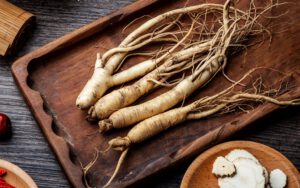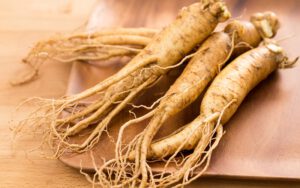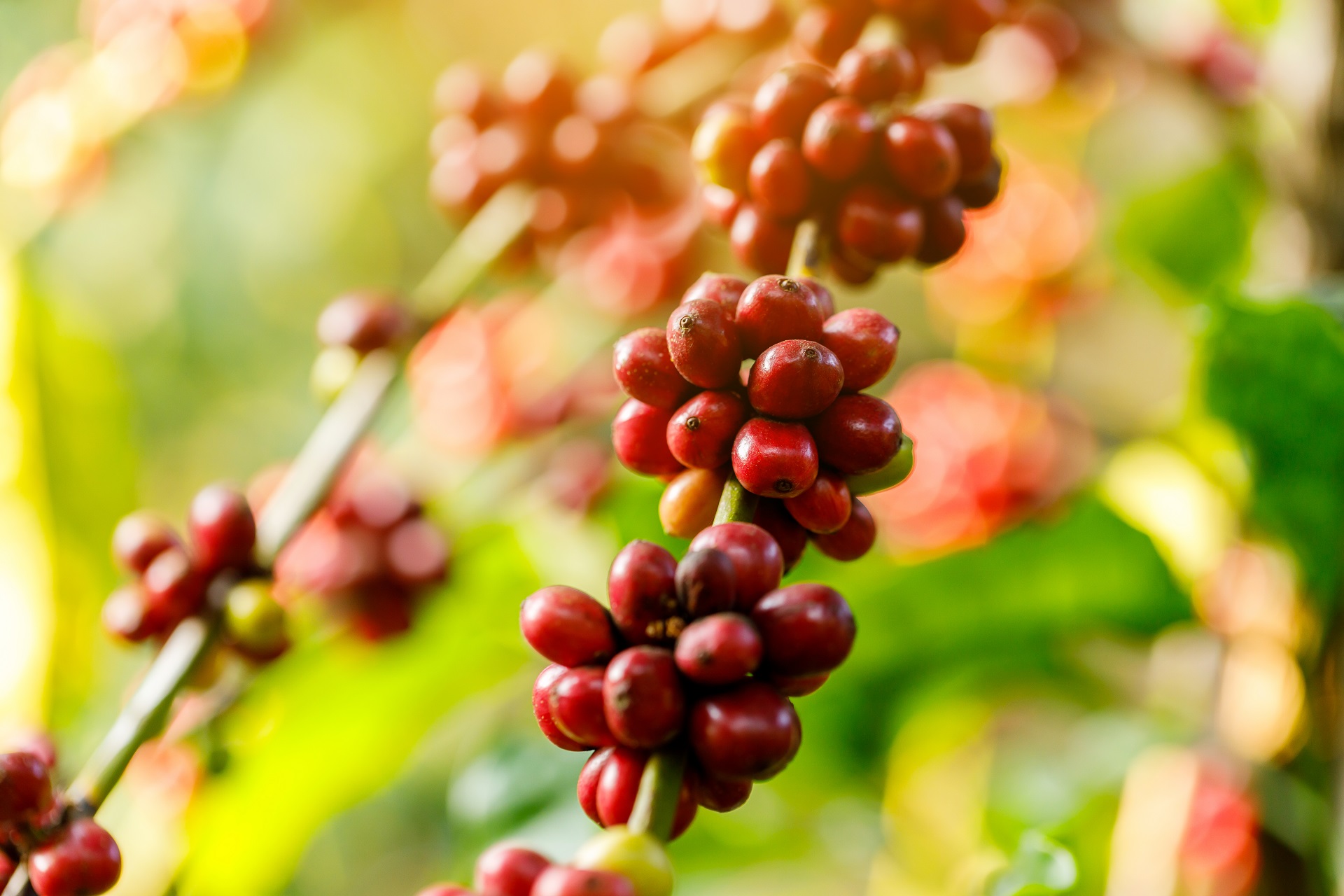American ginseng (Panax quinquefolius) – definition
American ginseng, as the name suggests, is grown in the United States and Canada and is one of the most commonly used types of ginseng. Panax quinquefolius has been used for a long time and is well documented in both the Chinese Pharmacopoeia and the American Pharmacopoeia. In addition, it is one of the best-selling medicinal herbs in the world. The main active compounds in American ginseng are polysaccharides, polyacetylenes and triterpenoid saponins, called ginsenosides, and these are primarily: Rb1, Rb2, Rc, Re and Rg1. The type and content of ginsenosides depends on their location in the plant, e.g. roots, leaves or fruit, and so far a total of 75 naturally occurring ginsenosides have been identified in Panax quinquefolius. The ginsenoside profile also varies depending on the area of cultivation, e.g. the total ginsenoside content, the ratio of protopanaxadiol to protopanaxatriol. Moreover, bioavailability after consumption and biological activity are influenced by the multitude of sugar groups in the main ginsenosides. The range of products containing American ginseng is wide and includes capsules, tablets, powder, tea, and ingredients of the root are added to beverages, cosmetics and medicines. Ginseng is described as an adaptogen, improving physical, mental and mental performance, as well as strengthening the body after exposure to stressful or painful stimuli. Modern pharmacological research has shown that Panax quinquefolius exhibits a variety of activities, including antioxidant, anti-inflammatory, anti-diabetic, immunomodulatory, anti-tumour or neuroprotective effects.

American ginseng (Panax quinquefolius) – health properties
In vitro and in vivo studies suggest that American ginseng may be involved in modulating the immune system and may be used against viral and bacterial infections and cancer. American ginseng has immunomodulatory properties, as it stimulates B-lymphocyte proliferation and increases interleukin IL-2, IL-10, NK cell numbers and interferon-γ production in mice. In a study involving 323 people, ginseng extract containing polysaccharides reduced the average number of colds per person and the severity of cold-like symptoms. The anti-infectious effect of ginseng is attributed to the enhancement of immune function and direct inhibition of virus replication. In addition, it has been suggested that ginsenosides and ginseng polysaccharides may also have immunoregulatory effects on gut-associated lymphoid tissue (GALT), beneficially modify the microbiome and increase the number of IgA in the jejunum. Metabolites of American ginseng saponins have apoptotic, antiproliferative properties and promote cell cycle arrest and inhibit tumour growth in vivo. In a double-blind, randomised, placebo-controlled study involving 364 cancer survivors receiving 2 g per day of American ginseng for 8 weeks, a significant improvement in cancer-related fatigue was seen in these individuals after 8 weeks. It was concluded that this may be related to the reduction of inflammation and the regulation of cortisol release by the stress axis. Four studies were included in the analysis assessing the effects of American ginseng on fatigue. Each study used a different measure of fatigue and differed in the dose of extract taken. All four trials revealed improvements in fatigue over time, with a significant improvement in the primary fatigue score in the intervention group compared to the control group demonstrated by the 8-week trial with the 2000 mg dose.
Panax quinquefolius has been shown to have antidiabetic properties, that is, it increases postprandial insulin levels and decreases the postprandial glycaemic response, resulting in improved glycaemic control in type 2 diabetes. In a systematic review evaluating 16 studies, a significant reduction in fasting blood glucose levels was noted in the ginseng consumption group compared to the control group.
Panax quinquefolius can also benefit the heart, kidneys and liver, protecting them from damage, as well as acting as a preventive against neurodegenerative disorders. In turn,
the beneficial effect of American ginseng extract on extrapyramidal symptoms was noted in 64 people with schizophrenia. In addition, ginsenosides can be used as a plant-based agent to protect the skin from UVB-induced photodamage and skin discolouration.

American ginseng (Panax quinquefolius) – safety
No significant side effects were observed in Panax quinquefolius supplementation. Due to the oestrogen-like effects of ginseng, it should be used with caution in women taking progestogens, among other things. Due to its immunomodulatory properties, immunocompromised individuals or those with autoimmune diseases should supplement ginseng with caution. In addition, warfarin or other anticoagulants or antiplatelet drugs should not be combined with ginseng, due to the high risk of bleeding.
Bibliography:
Mancuso C, Santangelo R. Panax ginseng and Panax quinquefolius: From pharmacology to toxicology. Food Chem Toxicol. 2017 Sep;107(Pt A):362-372.
Zhou R, He D, Xie J, Zhou Q, Zeng H, Li H, Huang L. The Synergistic Effects of Polysaccharides and Ginsenosides From American Ginseng (Panax quinquefolius L.) Ameliorating Cyclophosphamide-Induced Intestinal Immune Disorders and Gut Barrier Dysfunctions Based on Microbiome-Metabolomics Analysis. Front Immunol. 2021 Apr 22;12:665901.
Ghosh R, Bryant DL, Farone AL. Panax quinquefolius (North American Ginseng) Polysaccharides as Immunomodulators: Current Research Status and Future Directions. Molecules. 2020 Dec 11;25(24):5854.
Arring NM, Millstine D, Marks LA, Nail LM. Ginseng as a Treatment for Fatigue: A Systematic Review. J Altern Complement Med. 2018 Jul;24(7):624-633.
Yang Z, Deng J, Liu M, He C, Feng X, Liu S, Wei S. A review for discovering bioactive minor saponins and biotransformative metabolites in Panax quinquefolius L. Front Pharmacol. 2022 Aug 1;13:972813.
Wang Y, Choi HK, Brinckmann JA, Jiang X, Huang L. Chemical analysis of Panax quinquefolius (North American ginseng): A review. J Chromatogr A. 2015 Dec 24;1426:1-15.


